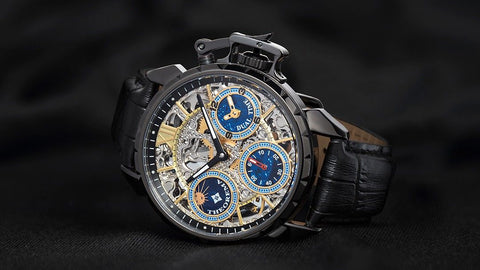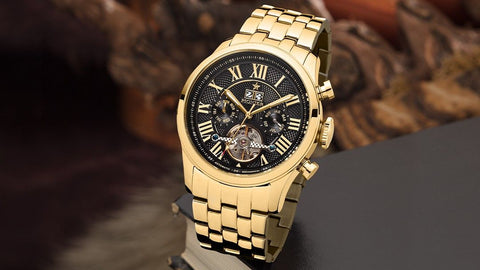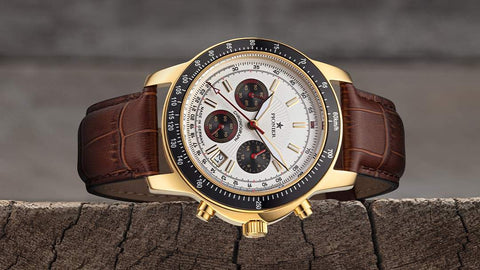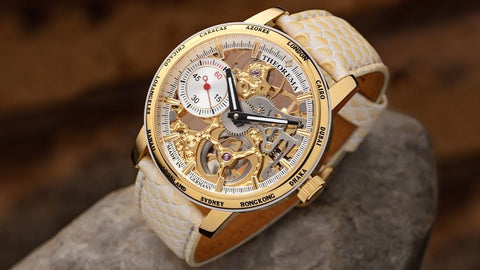A watch's dial text can provide you with a wealth of information regarding the brand, model, and occasionally even the kind of movement that powers the device. Consider the movement of a watch as the engine that drives its hands, date and day windows, and any other outwardly visible "complication," such as a chronograph. These watch movements generally fall into two primary categories: Quartz (battery-powered) and Mechanical (manual and automatic winding).
Spring tension and gears power mechanical watch movements. In contrast to quartz watches, which are run by batteries that cause tiny crystals to vibrate, they are self-sufficient miniature devices that don't require electric power sources.
Visual clues can also be used to determine if a watch is quartz or mechanical, but the simplest method is to look for writing imprinted on the caseback or dial. When a watch is actually in motion, quartz movements are "jumpier" and only move once every second, whereas mechanical movements sweep smoothly. Open faces, or windows, are another common characteristic of mechanical timepieces that show off the complex mechanical dance taking place inside. If you want to learn more about the similarities and differences between these types of watch movements, keep reading our comprehensive guide!
Tufina Theorema Toronto Mechanical Watch | GM-106-3 | Gold.
Should I pick a watch based on its movement?
The majority of us choose our first watch based on its appearance. However, as you become more knowledgeable about the inner workings of watches, it becomes difficult to ignore the fact that each one is a work of art in and of itself.
There is no one "correct" type of movement; both quartz and mechanical movements offer advantages, peculiarities, and special appeal. But there may be a watch movement out there that best suits your requirements and way of life.

Tufina Theorema Oman Mechanical Dual-Time | GM-108-4 | Black.
Mechanical Watches
The history of manual watch technology, also referred to as "hand-wound movements," spans decades and reached its zenith during World War I.
The majority of guys just didn't wear wrist timepieces before the War. Although they were seen as feminine jewelry, it is safer to glance at your wrist during a trench battle than to sit up and take your watch out of your pocket.
Before they could start strapping their pendant-style watches over their wrists, soldiers started requesting jewelers to add wire lugs to their timepieces. Men's wristwatches with automatic functions became popular after the war.
How do mechanical watches work?
Winding a manual watch requires daily effort, which is usually done by the user before wearing it in the morning.
A mainspring experiences strain from the daily winding, which generates force. This force is then sent via a gear train to an escapement, which gradually meters out power. The engineering and mathematics involved guarantee that the power is released at intervals consistent with our notion of a twenty-four-hour day.
Although the fundamentals of this technology haven't changed much throughout time, current manufacturing and technology enable considerably tighter tolerances and greater engineering, which has led to significantly improved accuracy in mechanical timepieces.
Benefits of mechanical watches
- Longevity: Well-maintained mechanical timepieces endure longer than most watches, making them wonderful heirlooms.
- No Batteries: There's never a need to swap out batteries. Your mechanical watch operates entirely on its own.
- Aesthetics: Watches with manual winding movements are typically more elegant and sophisticated in design.
- Simplicity: Any machine is usually more dependable the fewer parts it has. The purest, most basic form of a wristwatch is a manual-wind watch, as opposed to one with an automatic mechanical movement. Consequently, manual-wind watches can be constructed considerably thinner than automatic or quartz watches.
Drawbacks of mechanical watches
- Needs Winding: Most people do not find this to be an issue.
- Slightly Less Accurate: +/- 5/15 seconds a day are normally accepted in the world of mechanical watches.
Should you buy a mechanical watch?
Keep in mind that more expensive, collector timepieces that have a strong tendency to keep their value over time are frequently driven by mechanical movements. They're ideal for those who are drawn to exquisite workmanship by nature, have a keen sense of time, and can wonder at the intricacies of a fully working mechanical watch.

Tufina Pionier Havana Automatic Full Calendar Watch | P7001-8 | Gold.
Automatic Watches
In the early 20th century, automatics, often known as "self-winding" movements, were first improved and made widely available. They have a free-spinning rotor that spins in reaction to your body's natural movements, winding the mainspring throughout the day. Mechanically, they are quite similar to manual winding watches. This rotor almost completely eliminates the need for daily manual winding as long as you continue to wear the watch.
Automatic watches are typically more accurate than manual watches because they are maintained at full wind throughout the day. Today's high-end and luxury watch market is dominated by automatic watches because of their increased accuracy and convenience.
Should you buy an automatic watch?
If you still value fine engineering but would rather not have to wind your watch by hand every day, you might want to consider investing in a well-made automatic. You have a plethora of aesthetic choices in this category!

Tufina Pionier Tirona Chronograph Quartz Date-Calendar Watch | GM-550-4 | Gold.
Quartz Movements
When the Japanese brand Seiko defied industry expectations by introducing the first battery-powered Quartz watch in 1969, they completely changed the way people thought about watches. Due to the low cost of manufacturing and acquisition for many quartz movements, the market became more accessible to new companies and customers. Everyone now had access to affordable, dependable wristwatches for the first time in history.
How do quartz watches work?
Quartz movements don't need to be wound; they run on batteries. A quartz crystal receives electrical signals from batteries inside the case. After that, a circuit measures the vibrations and transforms them into a single electric pulse that occurs once every second. The resulting watch mechanism is significantly more accurate than any currently manufactured mechanical watch.
Benefits of quartz watches
- Accuracy: Compared to both types of mechanical timepieces, quartz movements are unquestionably more accurate.
- Simple to Use: Quartz watches make the ideal everyday, grab-and-go timepieces. Their only maintenance needs are to replace the batteries every few years.
- Cost: Generally speaking, quartz timepieces are far less expensive than mechanical watches.
Drawbacks of quartz watches
- Trade-off in Style: While accuracy is crucial, mechanical watches offer a timeless appeal that quartz watches don't always match.
- Battery Replacements: If you don't have the necessary equipment (or know-how), you'll need to take your watch to a jeweler on a periodic basis to have the batteries changed.
Should you buy a quartz watch?
Despite its precision, quartz movements aren't typically sought after by watch lovers (with a few exceptions). Quartz may be for you if you have no interest in engineering or mechanical. They also make great everyday timepieces for those who work or have active lifestyles.
Final Notes
Choosing a watch movement largely depends upon what you expect. Quartz is a good option if you desire low upkeep. We invite you to explore the world of mechanical timepieces if you're looking for a fine, functional heirloom. After that, it turns into a lifestyle issue. Which would you prefer—a daily connection to a timepiece that requires manual winding, or something more automatic that requires less thought? If you're still not sure, come see our collection of watches. It can sometimes be beneficial to see, feel, and even wear something before you can truly appreciate it.







Leave a comment